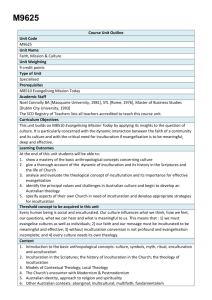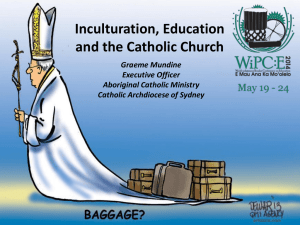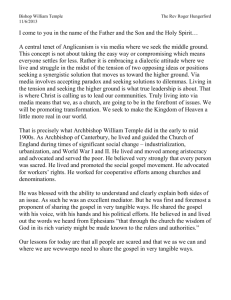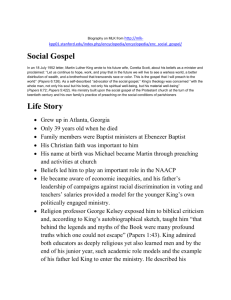The Relationship between Gospel and Culture
advertisement
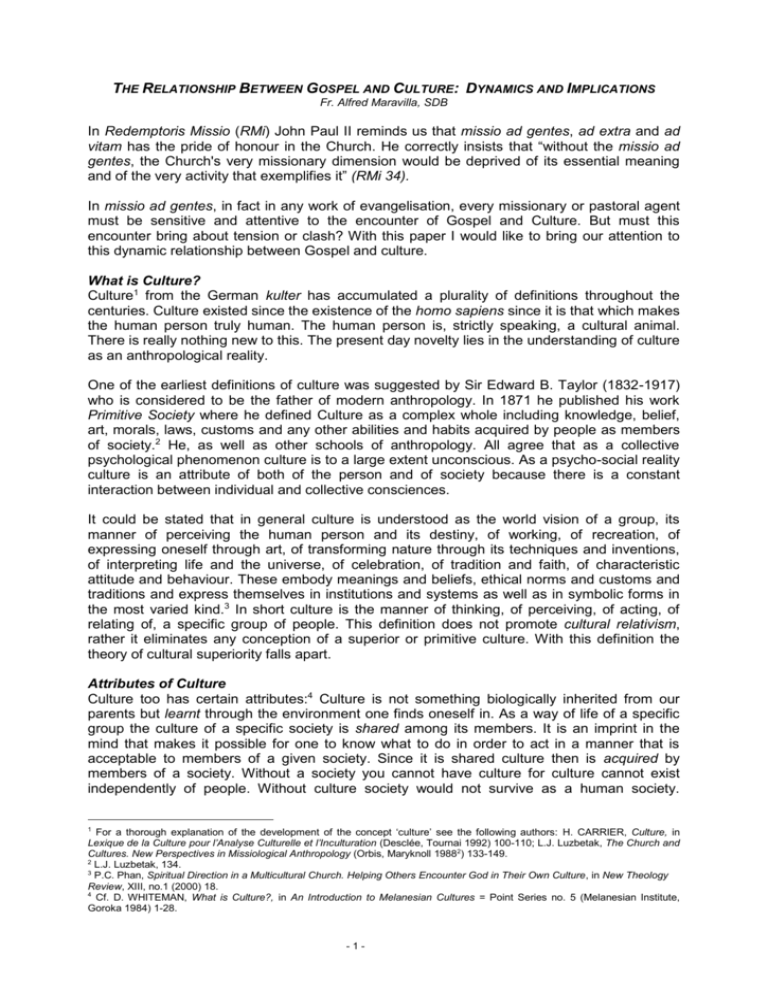
THE RELATIONSHIP BETWEEN GOSPEL AND CULTURE: DYNAMICS AND IMPLICATIONS Fr. Alfred Maravilla, SDB In Redemptoris Missio (RMi) John Paul II reminds us that missio ad gentes, ad extra and ad vitam has the pride of honour in the Church. He correctly insists that “without the missio ad gentes, the Church's very missionary dimension would be deprived of its essential meaning and of the very activity that exemplifies it” (RMi 34). In missio ad gentes, in fact in any work of evangelisation, every missionary or pastoral agent must be sensitive and attentive to the encounter of Gospel and Culture. But must this encounter bring about tension or clash? With this paper I would like to bring our attention to this dynamic relationship between Gospel and culture. What is Culture? Culture1 from the German kulter has accumulated a plurality of definitions throughout the centuries. Culture existed since the existence of the homo sapiens since it is that which makes the human person truly human. The human person is, strictly speaking, a cultural animal. There is really nothing new to this. The present day novelty lies in the understanding of culture as an anthropological reality. One of the earliest definitions of culture was suggested by Sir Edward B. Taylor (1832-1917) who is considered to be the father of modern anthropology. In 1871 he published his work Primitive Society where he defined Culture as a complex whole including knowledge, belief, art, morals, laws, customs and any other abilities and habits acquired by people as members of society.2 He, as well as other schools of anthropology. All agree that as a collective psychological phenomenon culture is to a large extent unconscious. As a psycho-social reality culture is an attribute of both of the person and of society because there is a constant interaction between individual and collective consciences. It could be stated that in general culture is understood as the world vision of a group, its manner of perceiving the human person and its destiny, of working, of recreation, of expressing oneself through art, of transforming nature through its techniques and inventions, of interpreting life and the universe, of celebration, of tradition and faith, of characteristic attitude and behaviour. These embody meanings and beliefs, ethical norms and customs and traditions and express themselves in institutions and systems as well as in symbolic forms in the most varied kind.3 In short culture is the manner of thinking, of perceiving, of acting, of relating of, a specific group of people. This definition does not promote cultural relativism, rather it eliminates any conception of a superior or primitive culture. With this definition the theory of cultural superiority falls apart. Attributes of Culture Culture too has certain attributes:4 Culture is not something biologically inherited from our parents but learnt through the environment one finds oneself in. As a way of life of a specific group the culture of a specific society is shared among its members. It is an imprint in the mind that makes it possible for one to know what to do in order to act in a manner that is acceptable to members of a given society. Since it is shared culture then is acquired by members of a society. Without a society you cannot have culture for culture cannot exist independently of people. Without culture society would not survive as a human society. For a thorough explanation of the development of the concept ‘culture’ see the following authors: H. CARRIER, Culture, in Lexique de la Culture pour l’Analyse Culturelle et l’Inculturation (Desclée, Tournai 1992) 100-110; L.J. Luzbetak, The Church and Cultures. New Perspectives in Missiological Anthropology (Orbis, Maryknoll 19882) 133-149. 2 L.J. Luzbetak, 134. 3 P.C. Phan, Spiritual Direction in a Multicultural Church. Helping Others Encounter God in Their Own Culture, in New Theology Review, XIII, no.1 (2000) 18. 4 Cf. D. WHITEMAN, What is Culture?, in An Introduction to Melanesian Cultures = Point Series no. 5 (Melanesian Institute, Goroka 1984) 1-28. 1 -1- Obviously culture is a product of the human person. Since the human person is dynamic, always on the process of growth and change, culture too is dynamic, it continually changes. The fact that culture changes is an indication that society is alive. Static or unchanging cultures are dead cultures. Elements of Culture We must never forget that particular elements of a culture do not exist in isolation. A culture is not a random mixture of unrelated elements. These elements are functionally interrelated with each other in form of ideas, worldview, behaviour patterns and material products forming a coherent cultural system. Hence every component of a culture has a value attached to it. In fact no matter how strange a culture may seem, it will cease to be as soon as it is viewed in its totality. However, although cultures are functionally integrated, their integration is neither static nor rigid, so all cultures are actually open to change. Yet every culture has a built-in drive toward continuity by preserving something of the past (tradition) to enable the people to better participate the future. It gives people a sense of security by relying that what has worked in the past will work in the future. If however change happens too rapidly or too chaotically then there will be resistance called cultural conservatism. As a result people would resist change that threatens their basic securities; people also resist proposed change that they do not understand. It is therefore important that proposed change should be presented in ways that are clearly understandable to the potential adopters of change otherwise it will be vehemently resisted. How then can we bring about a change in a particular culture? The only way to achieve change is either through discovery, invention of something absolutely new (internal change) or through borrowing from another culture (external change). Cultural change, therefore, begins with individual human persons and their ideas. The centre of cultural change is, hence, the mind of the receptor of the idea. Cultural change is a process that begins with an idea on the part of an agent of change and ends with its adoption or rejection by potential recipients. When the manner of thinking, of perceiving, of acting of individuals who make up the group change the ideas people hold in common changes. As these ideas spread throughout society culture begins to change. Here then we realise the importance of formation of people before structures! Ethnocentrism and Cultural Relativism Whenever one is confronted by a culture different from one’s own two possible extreme reactions could be triggered: ethnocentrism and cultural relativism. Ethnocentrism5 occurs whenever cultural differences are found. When one gets in touch with a different culture one tends to judge the other culture by the values and assumptions of one’s own culture. Of course by one’s own criteria all other cultures appear inferior. People everywhere consider their own culture as the most suitable or the best and that the others as less civilised. In fact all cultures are, to a certain extent, ethnocentric. A certain degree of ethnocentrism is the built-in assurance that ensures the culture’s survival. Another possible reaction to cultural encounters is cultural relativism6 which considers all cultures to be equally good. Any cultural norm, practice and tradition is, therefore, acceptable. All explanations are equally valid. One cannot speak of error because all behaviour is justified according to its cultural context. The position of cultural relativism is very attractive to both new arrival and old timer. It apparently shows high respect for other people and their cultures and avoids the mistakes of ethnocentrism and premature judgements. 5 Cf. H. CARRIER, Ethnologisation, in Lexique de la Culture, 158-159; P.G. Herbert, Anthropological Insights, 97-98; P.G. Herbert, Cultural Anthropology, 38. 6 Cf. P.G. Herbert, Anthropological Insights, 99-104 -2- Neither ethnocentrism nor cultural relativism is acceptable. For Christians, however, anthropology cannot stand alone. The Gospel sets the ultimate criteria in what needs to be accepted, ennobled, perfected or rejected in a culture. What is Inculturation? Inculturation7 is a relatively new theological term expressing an old reality in Christian history which is the insertion of the Christianity into different cultures and the establishment of new kinds of Christian communities. The term itself, however, has been in actual use in church documents only in the last thirty years. In fact it entered into the vocabulary of pontifical documents only when John Paul II used it for the first time in Catechesi Tradendae (n.53). The process of inculturation began in Oceania as immigrant people brought the Christian faith from their homelands. From the time the first immigrants and missionaries arrived, the Church in Oceania has inevitably been involved in a process of inculturation within the many cultures of the region, which often exist side by side (EIO8 n. 16, 17). The term inculturation is a neologism now commonly used in theological circles but one which needs a lot of explanation. Inculturation as a theological (not anthropological) term also connotes elements of cultural anthropology. It implies the penetration of the deepest strata of persons and peoples by the Gospel which touches them deeply, going to the very centre and roots of their cultures.9 It is important to stress, at the outset, that inculturation is not an act but a continuous dialogical process which denotes a ‘living exchange’ or dynamic relationship between Gospel and culture; between the local Church and the culture of its people. It supposes an interaction of a living faith with a living culture, both marked by transformation and growth, which are set in concrete relationship. Consequently such relationship requires mutual acceptance and dialogue, critical awareness and discernment, renovation and innovation.10 In inculturation the Gospel becomes inserted in a given culture transforming it from within by challenging certain values and cultural expressions. A particular culture, on the other hand, offers positive values and forms which can enrich the way the Gospel is preached, understood and lived thus enriching Christianity and the Church by interpreting and formulating anew the Christian message (Evangelii Nuntiandi n.20). It could be rightly stated that inculturation is the process by which "catechesis 'takes flesh' in the various cultures. It is a movement towards full evangelisation (Eccelsia in Africa n.59, 62) because it seeks to dispose people to receive Jesus Christ in an integral manner so that their faith takes root in the matrix of their being thus they are able to respond more fully to God’s own self-revelation by believing and loving as Christians rooted in the authentic values their own cultural traditions. Inculturation is clearly a two-way process. It is the integration of the Christian experience of a local Church into the culture of its people, in such a way that this experience not only expresses itself in elements of this culture, but becomes a food that animates, orients and innovates this culture so as to create a new unity and communion, not only within the culture in question but also as an enrichment of the Universal Church.11 The many cultures, each in 7 Cf. A.ROEST CROLLIUS, What Is So New About Inculturation?, in A.ROEST CROLLIUS, T.NKERAMIHIGO, What Is So New About Inculturation? = Inculturation. Working Papers on Living Faith and Cultures V (Pontifical Gregorian University, Rome 1991) S. KAROTEMPREL, Following Christ in Mission. A Foundational Course in Missiology (Propaganda Fede, Rome 1995) 110-119. 8 JOHN PAUL II, Post Synodal Apostolic Exhortation Ecclesia in Oceania (2001). 9 Congregation for the Clergy, General Catechetical Directory (Vatican City, 1997) n.109. 10 Cf.M de C. Azevedo, Inculturation in Dictionary of Fundamental Theology, R. Latourelle and R. Fischella (ed.) (New York: Crossroad, 1995) 501. 11 Fr. Pedro Arrupe, S.J. wrote in his letter to the members of the Society of Jesus of 1979 “L’inculturazione è l’incarnazione della vita e del messaggio cristiano in un’era culturale concreta, in modo che non solo l’esperienza diventi un principio d’ispirazione, allo stesso tempo norma e forza di unificazione, che trasformi e ricrei quella cultura, ponendosi così all'origine di una nuova -3- different ways, provide insights which help the Church to understand better and express the Gospel of Jesus Christ (EIO n.17) The Church, points out Pope John Paul II, in her efforts to present Jesus Christ effectively to the peoples of Oceania, must respect each culture and never ask the people to renounce it (EIO n.16). This means that we not only take the religious or neutral elements from the culture, if such elements exist at all, but also those elements which constitute the specific identity of a culture and see how these could be re-interpreted to deepen our understanding of Jesus so as to be able to present him more effectively to the people of that particular culture.12 For the indigenous peoples of Oceania, inculturation also meant a new conversation between the world that they had known and the faith to which they had come to believe (EIO n.16). Inculturation, then, is ‘necessary and essential’ (Pastores Dabo Vobis n.55). It is a delicate task which consists in inserting culturally the Gospel in all levels of ecclesial life: language used in preaching and catechesis, in liturgy, in sacred art, in theological research. For this to happen inculturation must reach the meanings and criteria of a given culture, its worldview, touching the deepest level of human reality and not just a mere transfer or modification of languages and methods, rites and symbols, organisations and norms, outward and inward manner of action and expression. This also often referred to as inculturation ad intra. Correlatively the evangeliser needs to understand the local culture, know the language, know the minds and hearts of the hearer, their values and customs, their problems and difficulties, their hopes and dreams as well as their stories of origin and settlement which are part of the dynamic identity formation for a people so that the Gospel may be proclaimed in the language and in the culture of its hearers (Ecclesia in America n.70) and offered to all who freely wish to listen and respond with clarity and conviction but respectfully (Ecclesia in Asia n.21). This in turn affects the way the Gospel is preached, understood and lived (EIO 16). Inculturation is not only the task of the Universal Church. The local Church is, in fact, the “locus of inculturation”.13 She is the primary protagonist (Catechesi Tradendae 53) involving the whole local community of believers under the guidance of the local Pastor. The laity’s role is of paramount importance here because it is they who are called to transform society by infusing the ‘mind of Christ’ into the mentality, customs, and traditions of the society they live in (RMi 52, 54). Although the real agents of inculturating the Gospel are those who belong to the culture itself, inculturation becomes more effective if the insider (local person) and the outsider (missionary) work together because the insider has a perspective that an outsider does not have while an outsider sees the result and consequences of the change advocated which an insider may not fully foresee. The more the local Church is inculturated into the local culture the more it enriches the universal Church. Since people change, evidently culture evolves. Inculturation, therefore, can hardly ever be said to be definitely achieved. It is a difficult, long, courageous and continuous process which is but the fruit of a progressive maturity in the faith (RMi 22). It is a slow process which takes time (RMi 52) and needs to be guided and encouraged, but not forced, lest it give rise to negative reactions among Christians (RMi 54). Having said all these one must stand guard against the danger of understanding inculturation solely in terms of traditional cultural values and traditions and incorporation of cultural elements in the liturgy. Far from it, inculturation is the insertion of the Gospel in the culture of creazione”. P.CHARENTENAY, A Proposito d’Inculturazione, in La Civiltà Cattolica (1994/2) 240; Cf. General Directory For Catechesis (1997) n.109. 12 Cf. S.Anand, The Asian Synod and Inculturation, in Mission Today, II, no.3 (2000) 333. 13 JOHN PAUL II, Ai Vescovi della Birmania in Visita ‘Ad Limina’ (7.6.1985), in Insegnamenti di Giovanni Paolo II, VIII/1 (Vaticano 1985) 1738. -4- today for, indeed, the proclamation of Jesus Christ must also reach contemporary culture. Today the Church is challenged to interpret the Good News for the peoples of Oceania according to their present needs and circumstances (EIO n.14). Through the shaping of a Christian mentality in ordinary life in families, in schools, in social communications, in cultural life, in the workplace, in economy, in politics, in leisure-time, in health and in sickness the Gospel becomes a path which gives meaning to contemporary existence. This type of inculturation is also called inculturation ad extra or evangelisation of culture (Ecclesia in Europa n.58). It is in this same light that the Church must respond in new and effective ways to moral and social questions as well as present Christ in a way well adapted to the younger generation and the rapidly changing culture in which they live (EIO n. 7, 14). Counter-Culturalism: An Indispensable Ingredient to inculturation “Let’s chew betel nut so we can be inculturated!”. It is not infrequent that I’ve heard this statement. Besides the fact that betel nut chewing is addictive as well as a health hazard (like smoking) and is greatly discouraged by local health authorities, such remarks often reveal a rather superficial if not a distorted idea of inculturation. Here it is important to point out that inculturation is not only a blind acceptance of all the values of a culture nor an external adaptation or accommodation of the Gospel to a particular culture with the desire to make the Christian message more attractive and superficially decorative and much less incorporating cultural elements in the liturgy. Although in her work of evangelisation the Church must respect every culture and must not ask people to renounce it (EIO n. 16) yet inculturation can never compromise the Christian message Gospel. There is a need here for a careful discernment and dialogue to see what is what is and what is not of Christ, what is essential and what is less so (EIO n.7, 16). Since the Gospel is all about metanoia, that is, conversion or change of heart, if therefore the Gospel enters a culture and it changes nothing, there is no real inculturation. Once the Gospel enters a culture that culture must undergo metanoia at its most profound level. The change that takes place as a result of this encounter does not destroy a culture. Instead it purifies and elevates it (Ecclesia in Africa n. 87). A particular culture, on the other hand, is prompted to open itself to the newness of the Gospel’s truth which responds to every human person’s profound longing for the Absolute and be stirred by this truth to develop in new ways to attain the fullness of life (EIO 16). Indeed inculturation implies purification of certain values, rites, traditions, practices that are contrary to the Gospel. Culture is a product of the human person who has been stained by original sin. Cultures could, therefore, be sinful and destructive. They could be cultures of death rather than of life. Hence, real inculturation must involve an element of counterculturalism because it must do away with all that is not worthy of humanity in its traditions, all that is a consequence of accumulated guilt and social sin because in every culture, there are elements of sin that need to be healed, ennobled and perfected (RMi 54). In my experience it is the important element of counter-culturalism that missionaries are often times hesitant to insist. However in certain cases where specific cultural values or practices are considered as anti-Gospel' it is important to first grasp the 'value' people see in them in order to bring about the necessary metanoia. In such cases the premise is that people insists on doing things or keeping a practice because they see a value in it. We must never forget that the real agents of inculturation are the local people. The role of expatriate missionaries is to prepare the local people to be able to inculturated the Gospel in their own culture. Hence the Gospel may only be inculturated once there is a local Christian community. -5- Practical Principles in Inculturating the Faith In the practice of inculturating the faith there are certain principles to be kept in mind: 1. Know the Story of Your People. A people’s story, their origin and settlement since they form part of the people’s dynamic origin. God’s mission in Oceania takes into account who the peoples of Oceania are and how they came to be. 2. Know the Language of the People. One cannot pretend to be inculturated if one is not able to communicate and grasp the nuances of a local language. One must be able to have a good command of a language in order to carry on not only a conversation but especially discuss ideas and concepts. 3. Build Up or Rejuvenate the Local Church. It is tremendously important that we participate in the life and activity of the local Church and promote its growth and development. The plantatio ecclesiae should never become merely plantatio congregationis. Certainly they are not diametrically opposed nor mutually exclusive. They could rather be complimentary. Our ecclesial vocation as members of the Salesian Family demands that we abide by the liturgical norms of the local episcopal conference regarding liturgy, liturgical vesture, etc (even if what we are used to is ‘more comfortable’). We also commit ourselves to renew, or better, rejuvenate the local Church by grafting onto her new energies, and making her more beautiful and attractive, to love her and give ourselves to her as Don Bosco would have wished us to do. 4. Distinguish Faith and Culture.14 God’s self revelation took place in a particular history, place, language and culture. Faith is our response to this self-gift of God through the development of a personal relationship with Him through trust and confidence. This faith is always embodied in form of beliefs celebrated in particular forms of community worship lived according to moral practices. Though faith is not identical with beliefs and the Gospel message with its cultural expressions faith can never exist from its articulation in beliefs and the Gospel message from its cultural enfleshments. The Christian faith is therefore, never culturally neutral. Much of our practices in Christianity are tied up with our cultural traditions. No culture should be regarded as incapable of and unqualified to embody the faith and Gospel message. Conversely no culture may be absolutised as the only adequate and privileged vehicle of the transmission of the Christian faith. This is what we mean when we say that faith and culture are transcultural. On the other hand the Gospel is said to be truly incarnated only if the local people develop their own cultural forms for expressing their new found faith in Christ. In fact “a faith that does not become culture is not fully accepted, not entirely thought out, not faithfully lived”.15 5. Discover Original Biblical and Dogmatic Meanings from the cultural forms of the Bible and the historical context of the dogmas. In the Old Testament God revealed his universal salvific plan to the Jews in a language they could understand, using the cultural forms and expressions of the Near East cultures. He started from where the people were embedded in their own culture. On the other hand it is important to remember that ‘the Gospel message cannot be purely and simply isolated from the culture in which it was first inserted (the biblical world or more concretely the cultural milieu in which Jesus of Nazareth lived), nor, without serious loss, from the cultures in which it has already been expressed down the centuries; it does not spring spontaneously from any cultural soil; it 14 Cf. P.C.Phan, Catechesis and Catechism as Inculturation of the Christian Faith, in Salesianum LXV (2003/1) 92-93. John Paul II, Address to the Italian National Congress of Ecclesial Movement for Cultural Commitment, in Insegnamenti di Giovanni Paolo II V/1 (1982) 131. 15 -6- has always been transmitted by means of an apostolic dialogue which inevitably becomes part of a certain dialogue of cultures’.16 6. Communicate Biblical and Dogmatic Meanings in a way which ensures the maximum transfer of meaning which is as close as possible to their original meaning. The Scriptures, Tradition and the Magisterium aid us in understanding the original biblical meanings and dogmatic definitions. It is important to remember that since the Gospel is always inculturated in the culture of the catechist, hence every Gospel proclamation always passes through the cultural screen of the catechist before it reaches the catechised. This is minimised if the catechist consciously tries to free the Gospel from these while at the same time using the cultural forms of the catechised. 7. Compatibility with the Gospel and Communion with the Universal Church are important principles which must guide any effort of inculturation. Without ‘compatibility with the Gospel’ inculturation will lead to a loss of the Christian faith and identity. Without ‘communion with the Universal Church’ inculturation could destroy the unity of the universal Church and lead to a sectarian mentality. The Ultimate Goal of Inculturation The way of Jesus is always the path of mission; and he is now inviting his followers to proclaim the Gospel anew to the peoples of Oceania, so that culture and Gospel proclamation will meet in a mutually enriching way and the Good News will be heard, believed and lived more deeply (n.10). In fact inculturation has no other goal than helping every human person, of whatever culture to mature in one’s own faith so as respond more fully to God’s own selfrevelation thus grow in holiness. Indeed inculturation is indispensable for any authentic Christian life in Oceania (EIO 16). We can only say that our faith is mature if it has taken root in the matrix of our being so that we may truly believe and love as Christians rooted in the authentic values of one’s own cultural traditions. But for this to happen, the Gospel must be presented with tools, methods and expressions coming from the cultures themselves. This is what we mean by inculturated faith, a faith that is transmitted and expressed through our people’s culture or cultures. 17 Implications for the Salesian Family I would just like to briefly point out some implications for us Salesian Family in Oceania. 1. The cultural preparation and introduction of expatriate missionaries must be given utmost importance. They must be helped to know the story, culture and especially to have a command of the language of the people they will serve. 2. Multicultural religious Communities are important in the inculturation of a charism. The multiculturality of religious communities could cause frictions and perhaps even misunderstanding among the members but it certainly frees our specific charisms from their cultural expressions, rooted in our countries of origin, and thus facilitate their inculturation. 3. Actively participate in the life and activities of the local Church and abide by the liturgical norms of the local bishops conference, animated by Don Bosco’s profound sense of the Church. We offer our services to and collaborate with the local bishop, taking into consideration our charisms, and at the same time enrich the local Church by the contribution of our specific charisms. We have to struggle to keep the balance as we are confronted by the constant tension to integrate ourselves into the life and activity of the local Church and to be faithful to our charism and not be just extra hands at the beck and call of the local ordinary. 16 JOHN PAUL II, Catechesi Tradendae, n. 53. Cf. ACTS AND DECRESS OF THE SECOND PLENARY COUNCIL OF THE PHILIPPINES (Catholic Bishops Conference, Manila 1991) no.72; Eccelsia in Africa n. 78. 17 -7- 4. Unless there are local vocations the charism of our congregations will never be inculturated. Growth in vocations could ultimately be a litmus test whether a religious charism has taken root in a specific culture. Where there is a dearth of vocations one could ultimately ask whether we have made enough effort to inculturate ourselves, hence our charisms, either ad intra or ad extra. In more advanced societies the question perhaps is whether our life as religious presents a counter-cultural challenge to youth so as arouse in them to live a more radical Christian life. Conclusion One of the most notable features of the peoples of Oceania is their powerful sense of community and solidarity in family and tribe, village or neighbourhood. This means that decisions are reached by consensus achieved through an often long and complex process of dialogue. Touched by the grace of God, the peoples' natural sense of community made them receptive to the mystery of communio offered in Christ. The Church in Oceania demonstrates a real spirit of cooperation, extending to the various Christian communities and to all people of good will. (EIO n.7). This historic gathering has certainly helped made each and every member of the Salesian Family in Oceania to realise what a force we are in the local Church if we are able to work in autonomy yet in communion with each other. A tremendous task lies ahead in our effort to inculturate the Gospel and our Salesian charism yet if we journey together as one Salesian Family in Oceania, though slow and difficult, such journey will certainly bear abundant fruits. Questions for Reflection and Sharing 1. How do we prepare missionaries in Oceania to foster the encounter of Gospel and culture? 2. How can we prepare our local people to be agents of inculturation? 3. What can we do to promote good and worthy local vocations? -8-
